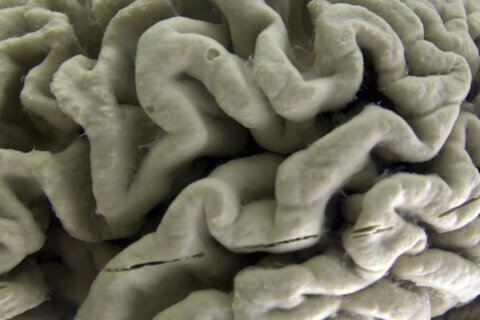Waking up from sleep drenched in sweat is an unpleasant, yet common sensation. There are several common reasons for night sweats — from spicy foods to warm bedrooms — but excess sweating can be a sign of a medical condition such as an infection, menopause or cancer.
“Just being hot at night should not worry anyone,” says Dr. Peter Bidey, vice chair and assistant professor of family medicine at the Philadelphia College of Osteopathic Medicine. “It is not uncommon that every once in a while someone might sweat while sleeping. However, it is more concerning if someone is having drenching night sweats on a regular basis.”
What Are Night Sweats?
Sweating is a normal and essential function of the human body to regulate temperature. Night sweats are defined as repeated episodes of extreme perspiration that drench your pajamas and bedding and interrupt your sleep, according to the Mayo Clinic. Night sweats can lead to significant sleep disturbance and restlessness and could be a symptom of another underlying medical issue.
[READ: How to Get a Good Night’s Sleep.]
Night Sweat Culprits
While night sweats are a common complaint at the doctor’s office, medical research is scarce as to what triggers excess sweat during sleep. However, there are some common culprits for night sweats.
The biggest culprit is the bedroom is too warm. Exercising, eating a spicy meal or drinking something hot too close to bedtime can contribute to waking up with excess sweat. If it happens occasionally, a few changes to your nighttime routine can likely cure nighttime sweats, like choosing a lighter blanket.
There are a number of medical conditions, illnesses and even treatments that may lead to night sweats. The most common include:
— Cancer.
Infections
Any infection that causes a fever can cause you to sweat at night. Most of these are transient and should resolve quickly. However, some more serious infections like tuberculosis and HIV can go undiagnosed for some time and are notorious for causing night sweats.
“Other infections that can present with night sweats include COVID-19 infection, malaria and bacterial infections such as a breast abscess in postpartum breastfeeding mothers,” says Dr. Nisha Verma, an obstetrician-gynecologist and family planning specialist at the American College of Obstetricians and Gynecologists in Washington, D.C.
Additionally, endocarditis (a bacterial infection of a heart valve) as well as osteomyelitis (a bacterial infection of a portion of bone) can also cause night sweats, Bidey adds. “These infections are serious and often go unnoticed for a period of time, so if you have any other associated symptoms with night sweats, make sure to follow up with your health care provider.”
Cancer
Some types of cancer present with night sweats as a symptom, accompanied by other signs such as unexplained weight loss, fever and excessive bruising. According to the Dana Farber Cancer Institute, leukemia and Hodgkin and non-Hodgkin lymphoma are cancers that may cause night sweats. Carcinoid and adrenal tumors can also present with night sweats as a symptom.
Night sweats can also be a side effect of some cancer treatments, especially certain types of hormone therapy used to treat prostate, gynecologic and breast cancers.
Medications
Certain medications list night sweats as a common side effect. If you experience regular night sweats after starting a new medication, tell your doctor as they can adjust the dose or prescribe a different medicine, Bidey says. “Antidepressant medications, tricyclic and selective serotonin reuptake inhibitors (SSRIs), are often the cause of night sweats. Over-the-counter pain medications like aspirin, acetaminophen and ibuprofen can also cause them from time to time. Also, patients who are taking diabetes medications can also have sweating at night if their blood sugars are dropping too low overnight.”
Some other common drugs known to cause night sweats in people include:
— Steroids, including prednisone and cortisone.
— Hormone therapy medications.
— Certain antipsychotics.
— Opioids.
Menopause
Hot flashes during the day and night sweats are common signs of perimenopause and menopause. “Hot flashes and night sweats occur around menopause due to estrogen withdrawal. This estrogen withdrawal leads to issues with the brain’s regulation of temperature,” Verma says. “In other words, the body’s thermostat becomes more sensitive to slight changes in body temperature, which leads to hot flashes and night sweats.”
Other Conditions
There are other medical disorders that may prompt night sweats, including:
— Overactive thyroid or thyroid disease like hyperthyroidism.
— Sleep disorders like obstructive sleep apnea.
— Hormonal changes like low testosterone.
[READ: How to Prepare for a Sleep Apnea Test.]
Tests to Determine the Cause
After a thorough physical exam to determine the cause of night sweats, doctors may decide to do some further testing to help confirm a diagnosis. Tests can include checking blood counts to look for signs of infection or some cancers, a fasting metabolic panel to look at electrolytes and blood sugars, thyroid testing, hormone levels in relation to menopause in women or low testosterone in men, as well as more specific testing to look for certain diseases like tuberculosis and HIV, according to Bidey. Other tests that may be considered include chest X-rays, measuring C-reactive protein level or polysomnography, otherwise known as a sleep study.
Alleviating Night Sweats
There are numerous ways to help your body better regulate its nighttime temperature. The most obvious are removing blankets, cranking up the air conditioning and going to bed with a window open or fan on. Sleeping with a leg out from under the covers can be helpful. Also, choose wick-away fabrics that absorb sweat and dry quickly. Avoid spicy food late in the day, especially if experiencing menopause. Even simple things like moving exercise time to earlier in the day can help.
When lifestyle changes don’t work, there are a few treatment options that are available for people experiencing bothersome night sweats. “Women experiencing menopause-related night sweats may need medications like hormone therapy or antidepressants,” Verma says.
[READ: Does Melatonin Work for Sleep?]
Related Symptoms
Before visiting a doctor, try making some lifestyle changes that may be contributing to night sweats. If you develop regular drenching night sweats along with other symptoms, it’s time to see your doctor.
Other related symptoms to watch out for are:
— Fever and/or chills.
— Bone or other localized pain.
— Persistent fatigue.
— Unexplained weight loss.
— Cough.
— Chest pain.
— Rashes, skin or nail changes.
More from U.S. News
Sleep Apnea: 11 Things That Make It Worse
Possible Causes of Sleepwalking
Night Sweats: What You Need to Know originally appeared on usnews.com
Update 02/23/22: The story was previously published at an earlier date and has been updated with new information.







